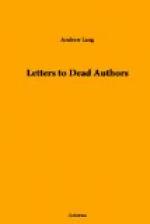‘Music is the perfection of the soul or the idea of poetry,’ so you wrote; ’the vagueness of exaltation aroused by a sweet air (which should be indefinite and never too strongly suggestive), is precisely what we should aim at in poetry.’ You aimed at that mark, and struck it again and again, notably in ‘Helen, thy beauty is to me,’ in ‘The Haunted Palace,’ ’The Valley of Unrest,’ and ‘The City in the Sea.’ But by some Nemesis which might, perhaps, have been foreseen, you are, to the world, the poet of one poem—’The Raven:’ a piece in which the music is highly artificial, and the ‘exaltation’ (what there is of it) by no means particularly ‘vague.’ So a portion of the public know little of Shelley but the ‘Skylark,’ and those two incongruous birds, the lark and the raven, bear each of them a poet’s name vivu’ per ora virum. Your theory of poetry, if accepted, would make you (after the author of ’Kubla Khan’) the foremost of the poets of the world; at no long distance would come Mr. William Morris as he was when he wrote ‘Golden Wings,’ ‘The Blue Closet,’ and ‘The Sailing of the Sword;’ and, close up, Mr. Lear, the author of ’The Yongi Bongi Bo,’ and the lay of the ‘Jumblies.’
On the other hand Homer would sink into the limbo to which you consigned Molie’re. If we may judge a theory by its results, when compared with the deliberate verdict of the world, your aesthetic does not seem to hold water. The ‘Odyssey’ is not really inferior to ‘Ulalume,’ as it ought to be if your doctrine of poetry were correct, nor ‘Le Festin de Pierre’ to ‘Undine.’ Yet you deserve the praise of having been constant, in your poetic practice, to your poetic principles—principles commonly deserted by poets who, like Wordsworth, have published their aesthetic system. Your pieces are few; and Dr. Johnson would have called you, like Fielding, ‘a barren rascal.’ But how can a writer’s verses be numerous if with him, as with you, ’poetry is not a pursuit but a passion . . . which cannot at will be excited with an eye to the paltry compensations or the more paltry commendations of mankind!’ Of you it may be said, more truly than Shelley said it of himself, that ’to ask you for anything human, is like asking at a gin-shop for a leg of mutton.’
Humanity must always be, to the majority of men, the true stuff of poetry; and only a minority will thank you for that rare music which (like the strains of the fiddler in the story) is touched on a single string, and on an instrument fashioned from the spoils of the grave. You chose, or you were destined
To vary from the kindly race of men;
and the consequences, which wasted your life, pursue your reputation. For your stories has been reserved a boundless popularity, and that highest success — the success of a perfectly sympathetic translation. By this time, of course, you have made the acquaintance of your translator, M. Charles Baudelaire, who so strenuously shared your views about Mr. Emerson and the Transcendentalists, and who so energetically resisted all those ideas of ‘progress’ which ’came from Hell or Boston.’ On this point, however, the world continues to differ from you and M. Baudelaire, and perhaps there is only the choice between our optimism and universal suicide or universal opium-eating. But to discuss your ultimate ideas is perhaps a profitless digression from the topic of your prose romances.




